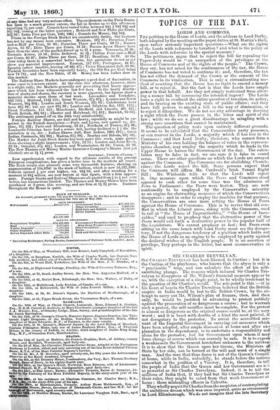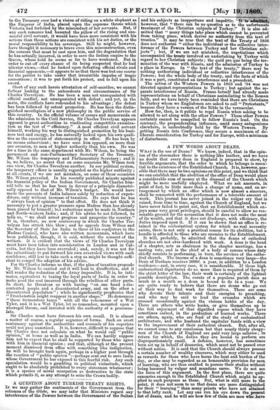SIR CHARLES TREVELYAN,
Stn CHARLES TREVELYAN has been likened to Curtins ; but it is the Curtius of the playhouse, who knows that the abyss is only a " practicable " trap, and can calculate the effect of his self- sacrificing plunge. The reasons which induced Sir Charles Tre- velyan to disapprove of Mr. Wilson's financial measure appear to us, with the exception of a single point, to be wholly irrelevant to the question of Sir Charles's recall. The sole point is this :—if in his heart of hearts Sir Charles Trevelyan believed that the British empire in India would be lost to the British Crown, by the at- tempt to carry out Mr. Wilson's plan of finance, then, and then only, he would be justified in advancing to protest publicly against the prosecution of so dangrerous a course ; but to warrant such a protest, the self-sacrifice must be complete. For the protest is almost as dangerous as the original course could be, at the very worst ; and it is beset with doubts of a kind the most painful, if not derogatory to the protestor. To arrest the accredited ser- vant of the Imperial Goverment in carrying out measures which have been adopted, after ample discussion at home and after ex4 planation in the dependency, is to undertake a responsibility noe alone for the protestor, but for Government upon whom it may force change of course which can scarcely be safe. It is to exposo a weakness in the Government heretofore unknown to the nativesi It is to show that the Queen upon her throne, the Ministers de State by her side, can be turned at the will and word of a single' man. And the man that thus dares is not of the Queen's Council at home, while in India, unluckily, he stands before the natives
somewhat in the position of a Viceroy. It is, therefore, to tell the people of India that the Queen and her Government are not so powerful as Sir Charles Trevelyan. Indeed, it is to tell the millions of India that, if they had but Sir Charles Trevelyan as their ruler, they might be saved from that weak Government at home ; those misleading officers in Calcutta.
They wholly acquit Sir Charles from the suspicion. of contemplating the ambitious dream which was once imputed, quite as erroneously to Lord Ellenborough. We do not imagine that the late filectretary to the Treasury ever had a vision of riding on a white elephant as the Emperor of India, placed upon the supreme throne which -Victoria had forfeited by the misconduct of her servants. But, if any such romance had haunted the pillow of the rising and suc- cessful civil servant, it would have been more consistent with his actions than those actions are consistent with his set duties, or the moral responsibility to his sovereign. Still he might, however, have thought it necessary to brave even this misconstruction, even the censure that must be oast upon him, and the degradation that he has actually incurred, in order to save the Indian empire to the Queen whose hold he seems so far to have weakened. But in order
Queen, cut off every chance of its being suspected that he had ulterior views,—that he looked upon defeating official rivals and
financial opponents,—it appears to us that there was but one course for the patriot to take under that irresistible impulse of tragic earnestness ; it was to put forth his protest, and to fall upon his sword.
Short of any such heroic attestation of self-sacrifice, we cannot forbear looking to the antecedents and circumstances of Sir Charles Trevelyan. He has been a man not unacquainted with official conflict, not unacquainted with defeat ; and yet, in the main, the conflicts have redounded to his advantage ; the defeat has been followed by actual promotion. He has been the distin- guished mouthpiece of a new philosophy in the public service of this country. In the official volume of essays and memoranda on the admission to the Civil Service, Sir Charles Trevelyan appears opposed to great authorities in vindicating competitive examina- tion as the test of "efficiency." A most efficient civil servant himself, working his way to distinguished promotion by his busi- ness tact and energy, he has naturally looked upon his own quali- ties as the essentials of statesmanship in office. He has been by no means subservient ; we have seen him opposed, on'more than one occasion, to men of higher authority than his own. He was for a time in the same department with Mr. Wilson, he being the permanent and non-Parliamentary Secretary of the Treasury,
Mr. Wilson the temporary and Parliamentary Secretary . and it is, we believe, no secret that on some occasions Mr. Wilson took
one view, Sir Charles Trevelyan another. In our political system, the temporary officer is usually regarded as the higher authority ; at all events, if we are not mistaken, on some of these occasions Mr. Wilson prevailed. In his recently published minute against the financial policy of the Indian Government, Sir Charles him- self tells us that he has been in favour of a principle diametri- cally opposed to that of Mr. Wilson's budget. He would have made the accounts of India balance solely by reduction of expen- diture, only without increase of taxation. He says that he has " always been of opinion" to that effect. He does not think it necessary to put a greater pressure upon Madras than has already been placed by himself; but reductions must be made in Northern and North-western India ; and, if his advice be not followed, he tells us, " we shall arrest progress and pauperize the country." It is, therefore, no new controversy in which Sir Charles Tre- velyan has struck this blow; and he appeals from Wilson and the Secretary of State for India to three of his coadjutors in the Madras Council, who have also written memoranda, which have been published, though, it is said, without the consent of the writers. It is evident that the views of Sir Charles Trevelyan must have been taken into consideration in London and in Cal- cutta, but they have been overruled ; and, surely, it was not for the subordinate to put forward his own overruled views with such confidence, still less to take such a step as might be thought suffi- cient to compel the adoption of his advice. For Sir Charles informs us that, if the plan of taxation proposde by Mr. Wilson be carried out it will lead to disaffection, and it will render the reduction of the Army impossible. It is, he inti- mates, equivalent to taxing the loyal parts of India in order to make good the cost incurred through the rebellion of other parts. In short, he threatens us with having "on one hand a dis- contented people and a discontented army, and. on the other a discontented. population " ; while he significantly prophecies that "Frankenstein might reappear in another shape. He denounces "these tremendous taxes" with all the vehemence of a Witt Tyler, and it is a Wat Tyler, let us remember, mounted upon a viceregal throne, and invested with the authority of a proconsu- late.
Sir Charles must have foreseen his own recall. It is almost a matter of course' a regular sequence of forms. Such an overt
contumacy against the authorities and counsels of his superiors could not pass unnoticed. It is, however, difficult to suppose that Sir Charles does not calculate on what he would call "public opinion," at home as well as in India. We can hardly suppose him not to expect that he shall be supported by those who agree with him in financial opinion ; and that, although at the present moment dismissed from office with something like indignation, he will be brought back again, perhaps in a higher post through the reaction of "public opinion "—perhaps sent out to save India whose Government he has exposed to this fearful risk. Any such speculation would be a gambling in political vicissitude, which ought to be absolutely prohibited to every statesman whatsoever ; it is a species of moral usurpation as destructive to the state which permits it, as any attempt to seize the Crown bodily.



























 Previous page
Previous page